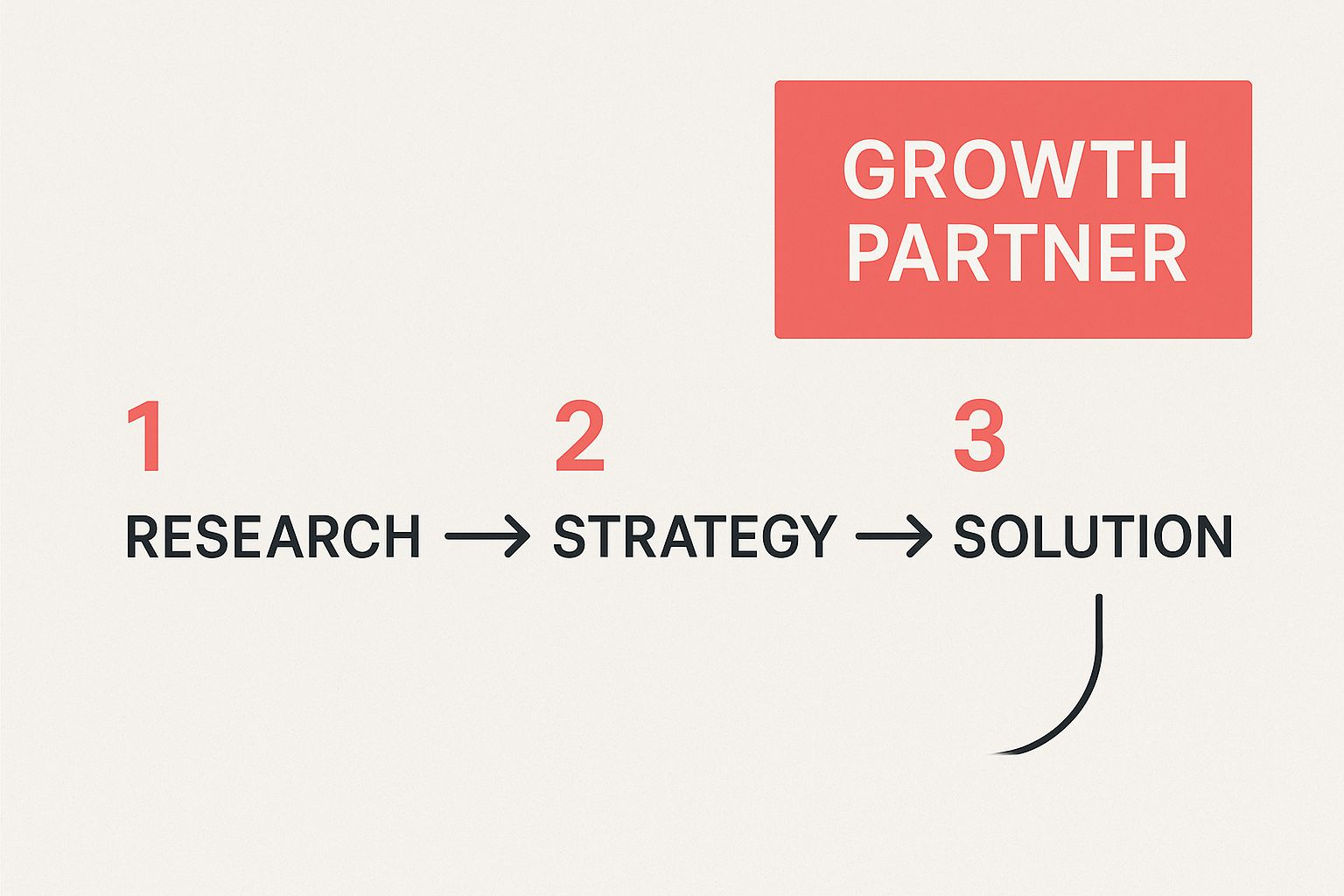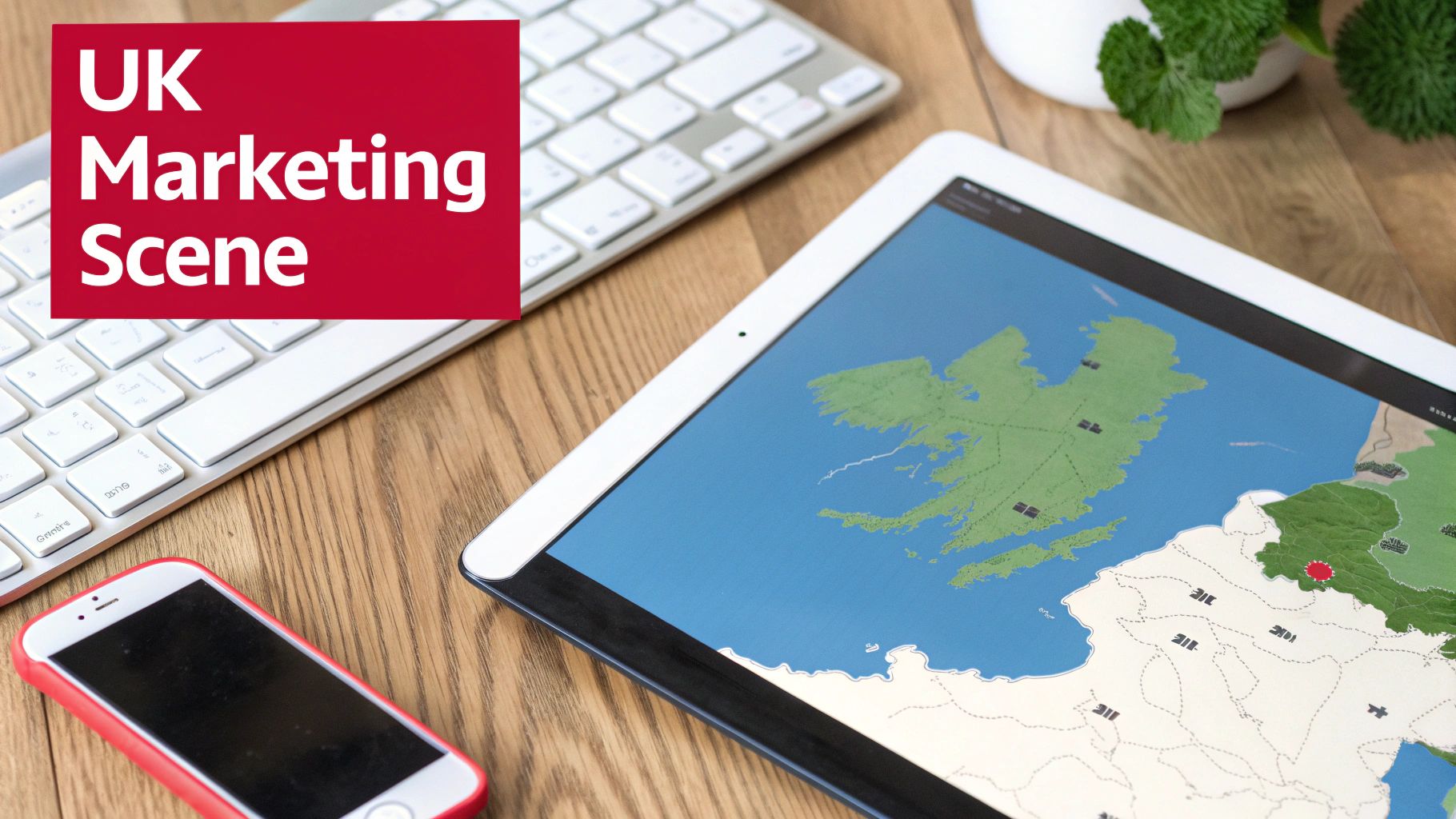Top Digital Marketing Agency for Startups | Grow Your Business
Picking the right digital marketing agency for startups isn’t just about offloading a few tasks. It’s about finding a genuine strategic partner who is as committed to your growth as you are. You’re looking for an extension of your own team, one that gets the unique pressures of scaling a new business in a cut-throat market.
Why the Right Agency Is Your Startup's Growth Partner
For startups in the UK, especially in fiercely competitive hubs like London, the climb to the top is a steep one. The heat is on to grow fast and efficiently, all while trying to stand out in a ridiculously crowded space.
This is where the difference between hiring any old agency and securing a real growth partner becomes crystal clear. A true partner does more than just run a few campaigns. They bring a level of specialised expertise that a small, stretched in-house team simply can’t replicate.
The benefits of getting the right agency on board are massive. We're talking deep, hands-on knowledge in the areas that matter most—like growth marketing, slashing customer acquisition costs (CAC), and rolling out strategies that can actually scale from day one. This lets you and your founding team get back to focusing on what you do best: building an incredible product and running the core business. You can read more about the benefits here: https://www.superhub.biz/8-benefits-of-outsourcing-your-marketing-to-a-digital-marketing-agency.
A Strategic Extension of Your Team
Think of your ideal agency as a co-pilot. They don't just sit there and wait for instructions; they help you read the map, see the turbulence coming, and find the smartest route to your destination. Their real value comes from that external perspective, backed by hard data and experience from working across dozens of industries.
When it comes to scaling quickly, a forward-thinking agency will be using advanced techniques like AI for B2B lead generation to get you ahead.
This infographic shows exactly what it looks like when that partnership clicks and becomes a real engine for growth.

It’s all about the synergy you get when an agency slots in seamlessly with your own team, acting as a single, focused unit.
Navigating a Competitive Market
The UK's digital marketing scene isn't just growing; it's absolutely exploding.
By 2025, the UK digital advertising market was already pegged at £20.4 billion , and it's projected to keep growing by 7.2% every year through to 2030. This boom is being driven by startups just like yours in high-stakes sectors like fintech, AI, and e-commerce, where every single marketing pound has to count.
Choosing an agency isn't just another item on the procurement list—it's a critical business decision. It's an investment in specialised knowledge, strategic agility, and, ultimately, the sustainable growth of your venture. Your success hinges on finding a team that's as invested in your business as you are.
Defining What Your Startup Actually Needs from an Agency
Before you even think about shortlisting a digital marketing agency, you need to look inwards.
It’s tempting to jump straight into searching for the ‘best’ agency, but without a crystal-clear picture of your own objectives, you’re asking them to guess what success looks like. The first, and most critical, step is to define what you actually need them to achieve for your startup.
Skipping this homework is a classic mistake. It almost always leads to wasted budget, misaligned expectations, and a whole lot of frustration. You have to move beyond vague goals like "we need more traffic" and get ruthlessly specific.
Are you trying to build brand awareness from the ground up? Generate a steady stream of qualified leads? Or perhaps validate your product in a brand-new market? Each of these goals requires a completely different strategy, skillset, and approach.
Setting Goals That Actually Matter
Ambiguous goals are the enemy of effective marketing. Full stop. To get real results, you need to set SMART goals —that’s Specific, Measurable, Achievable, Relevant, and Time-bound. This simple framework is brilliant because it turns fuzzy ideas into concrete targets that an agency can actually build a strategy around.
Let’s look at a couple of real-world scenarios:
- A UK fintech startup might set a goal to "Reduce our Customer Acquisition Cost (CAC) by 30% within the next six months by optimising our Google Ads campaigns and improving landing page conversion rates."
- An e-commerce brand selling sustainable goods could aim to "Increase organic search traffic by 50% in nine months by targeting long-tail keywords related to ethical consumerism and building high-quality backlinks."
See the difference? These goals are precise, measurable, and have a clear deadline. They give you a proper benchmark to measure an agency’s performance against. For many startups, a core need is also understanding effective B2B lead generation strategies on LinkedIn , which a good agency can deliver on once a clear objective is in place.
Your Pre-Agency Audit Checklist
To really nail down what you need, it pays to do a quick internal audit. This exercise doesn’t just prepare you for those initial agency conversations; it helps you figure out what type of partner you’re looking for. You’re not just hiring a service provider—you’re bringing in a team to fill specific gaps in your business.
To get a broader perspective on what support is out there, it can be helpful to explore a range of start-up business services before you commit.
Before you send a single email, sit down with your team and answer these questions honestly:
- What’s our realistic monthly budget? Be upfront about your finances. A great agency can achieve brilliant results even with a modest budget, but only if they know the constraints from the start.
- What skills are we missing internally? Do you lack expertise in technical SEO, paid social advertising, or content creation? Pinpointing these gaps helps you find an agency with the right strengths.
- Who is our exact target audience? You need to define your ideal customer profile in detail. The more specific you are, the better an agency can tailor its campaigns.
- What are our primary Key Performance Indicators (KPIs)? Decide which metrics truly matter to the business. Is it conversion rates, lead quality, website engagement, or brand mentions?
To help you through this process, we've put together a simple checklist. Use this table to organise your thoughts and get everything down on paper before you start your search.
Startup Marketing Needs Assessment Checklist
This checklist is designed to help you self-assess your marketing requirements before you even speak to an agency. It will force you to think critically about your goals and what success truly looks like for your startup.
| Assessment Area | Key Questions to Answer | Example Goal |
|---|---|---|
| Business Objectives | What is the single most important business goal for the next 6-12 months? (e.g., revenue growth, market share, user acquisition) | Increase monthly recurring revenue (MRR) by 25% in the next two quarters. |
| Target Audience | Who is our ideal customer? What are their pain points? Where do they hang out online? | Target Series A tech founders in London who are struggling with scaling their sales teams. |
| Internal Resources | What marketing activities can we handle in-house? What is our team's current capacity? | We have a content writer but lack any technical SEO or paid advertising expertise. |
| Budget & Financials | What is the maximum we can invest per month? What is our customer lifetime value (LTV)? | A maximum monthly marketing spend of £5,000, with an average LTV of £15,000. |
| Key Performance Indicators (KPIs) | Which 3-5 metrics will define success for us? (e.g., cost per lead, conversion rate) | Primary KPIs: Number of qualified leads, cost per qualified lead, and sales conversion rate. |
Completing this checklist will give you a solid foundation for your agency search. It ensures you go into conversations prepared, focused, and ready to find a partner who can deliver tangible results for your business.
By defining your needs with this level of detail, you completely change the conversation. You shift from asking, "So, what can you do for us?" to stating, "Here are our specific goals—how would you achieve them?" This simple change empowers you to vet agencies based on their strategic thinking and capabilities, not just their sales pitch.
How to Properly Vet a Potential Marketing Agency

Alright, you know what you need. Now comes the real work: separating the genuine contenders from the agencies that just talk a good game. This is where you cut through the noise of slick presentations and focus on one thing: tangible proof they can deliver.
Your first round of searching probably gave you a long list of potential partners. The goal right now isn't to pick a winner. It’s to aggressively slash that list down to a manageable shortlist of three to five agencies that are actually worth having a proper conversation with.
To do this, you need to be systematic. Forget the flashy websites and vague promises of “skyrocketing your growth.” You’re looking for hard evidence that they get the specific challenges and breakneck pace of the startup world.
Analyse Portfolios for Genuine Startup Experience
The first filter is dead simple: have they actually worked with startups before? An agency that spends its days managing huge corporate accounts might really struggle with the agility and tight budgets that define a new business. You need a partner who’s used to making every pound count.
As you look through an agency’s portfolio, zero in on businesses at a similar stage to yours. If you’re a pre-seed SaaS company, an agency whose crowning achievement is a campaign for a multinational retailer probably isn’t the right fit.
Dig deep into their case studies. A good case study is more than just pretty graphs showing an uptick in traffic. It should tell a story. What was the problem? What was the strategy? And most importantly, what were the business results ? We’re talking about increased revenue, a lower cost per acquisition, or better customer lifetime value—metrics that actually matter, not vanity numbers like impressions.
Pay close attention to the language in their testimonials and case studies. If clients mention the agency's adaptability, proactive communication, and ability to pivot strategy based on data, it’s a strong signal they understand the startup mindset.
Scrutinise Their Strategic and Data-Driven Mindset
A great digital marketing agency for startups is a strategic partner, not just a task-doer. They should be completely obsessed with data, using it to back up every single decision.
On those initial discovery calls, listen carefully to how they talk about strategy. Are they asking sharp questions about your business model and ideal customer, or do they jump straight into pitching their services? A real partner will want to understand your business inside and out before even thinking about a solution. Their ability to do this is a huge factor in how to choose a digital marketing agency that will genuinely align with your goals.
The UK is full of agencies that specialise in helping new businesses. The best of them offer flexible, data-led approaches designed for scaling. For instance, some agencies are known for their laser focus on SEO and PPC, constantly using performance data to tweak strategies for startups in everything from tech to e-commerce.
As you build your shortlist, use this simple checklist to keep your thinking consistent for each potential agency:
- Industry Relevance: Have they got real, demonstrable experience in your industry or a very similar one?
- Startup Fit: Have they worked with businesses of a similar size and growth stage to yours?
- Result Focus: Do their case studies prove they deliver tangible business outcomes like revenue growth or improved ROI?
- Pricing Transparency: Are they upfront and clear about their pricing models and what’s included?
- Cultural Alignment: Honestly, do their values and communication style feel like a good fit for your team?
Using these practical criteria will help you get from a sprawling list of possibilities to a focused shortlist of high-potential partners.
Insightful Questions to Ask Before You Sign Anything
Once you’ve got a shortlist of agencies that look good on paper, the real work begins. This is your chance to dig deeper than their slick case studies and get a feel for how they really think and operate.
Forget the generic interview questions. You need to ask the tough, insightful questions that reveal their true capabilities and, just as importantly, if they’re the right cultural fit for your team.
A great digital marketing agency for startups won't just reel off rehearsed answers. They’ll welcome the challenge because it shows you’re a serious founder looking for a genuine partner, not just another supplier to manage. Your goal here is to guide the conversation, see how they solve problems on the fly, and make sure your expectations are perfectly aligned before any contracts are signed.
Strategy and Onboarding
This is where you find out if they’re strategic thinkers or just button-pushers. Their answers will tell you whether they have a structured, thoughtful process for the first 90 days or if they’re just planning to "wing it."
-
"What does your onboarding process actually involve, and who from our team needs to be available?" A solid answer will outline a clear roadmap: discovery workshops, analytics access, stakeholder interviews. It proves they value getting under the skin of your business from day one.
-
"How do you pivot if the initial campaigns aren't hitting the mark?" This is a critical one. You're listening for a response that centres on data analysis, agile tweaks, and a "test and learn" mindset—not excuses or finger-pointing.
-
"Based on our goals, which channels would you prioritise first, and why?" This is a direct test of their strategic thinking. A proper partner will justify their choices with data and a clear line of logic that connects directly back to the business objectives you gave them.
The quality of an agency's strategic thinking is the single best predictor of your future success. An agency that invests time in truly understanding your business before pitching solutions is one that sees you as a partner, not just a monthly retainer.
Execution and Reporting
Time to get into the nitty-gritty of how they work. You need to know exactly who will be managing your account day-to-day and, crucially, how they measure and report on what’s working.
-
"Who will be our main day-to-day contact, and what's their experience with startups like ours?" It’s vital to know if you’ll be working with a senior strategist or a junior account manager. Direct experience with the unique pressures and pace of a startup is a massive bonus.
-
"Can you walk us through an example of a performance report you provide to clients?" A good report is more than a data dump. It should deliver actual insights, explain what the numbers mean for your business, and recommend clear next steps.
-
"How do you measure ROI beyond simple metrics like traffic or clicks?" Their answer needs to connect the dots between marketing activities and real business outcomes, like Cost Per Acquisition (CPA), lead quality, and Customer Lifetime Value (LTV).
Communication and Culture
Finally, you need to figure out if their team will actually gel with yours. A clash in communication styles or company culture can create endless friction, even if their technical skills are top-notch.
- "What’s your preferred rhythm for communication—weekly calls, monthly reports, a shared Slack channel?"
- "How do you handle disagreements or constructive feedback on creative or strategic direction?"
- "Tell me about a time you had to deliver bad news to a client. How did you handle it?"
These questions cut straight to their approach to transparency, collaboration, and relationship management. The right partner will be honest, proactive, and treat the relationship as a two-way street built on trust.
Understanding the UK's Digital Marketing Playground
Before you can pick the right digital marketing agency for your startup, you need to understand the rules of the game. The UK market has its own pace and its own quirks, and getting a feel for what actually works for British businesses gives you a massive head start when you sit down with potential agency partners.

Right now, the scene is a blend of tried-and-true methods and a scramble to adopt new tech. Some channels just keep delivering the goods, while other tools are completely changing how agencies work, from finding the right audience to tweaking campaigns on the fly. Knowing these trends will help you ask better questions and spot an agency that’s genuinely on the ball.
SEO Is Still King
In the UK, showing up on Google isn’t a luxury; it’s the bedrock of any solid strategy. The numbers back this up, with a huge 77% of UK businesses putting money into search engine optimisation (SEO). For a startup, this usually means winning your local patch first.
Local SEO is incredibly powerful here. Think about it: an incredible 46% of all Google searches in the UK have local intent. This shows just how vital it is for new businesses to get a foothold in specific cities like Manchester, Bristol, or London.
Of course, paid search ads are still a big player, with 65% of businesses using platforms like Google Ads to get traffic through the door quickly. But social media marketing is the real giant, with an 89% adoption rate across UK businesses. It's the go-to for building a brand and talking to your community. If you want to dig deeper, you can explore more of these UK digital marketing facts and figures to get a clearer picture.
Here's a pro tip: When you're talking to an agency, don't just ask if they "do SEO." Get specific. Ask them how they’d tackle local SEO for a UK audience and what their plan would be to capture that valuable, location-based search traffic for your startup.
AI and Automation Are Changing Everything
Beyond the usual channels, the biggest shake-up in UK marketing is the race to adopt AI. The agencies worth their salt are using artificial intelligence for everything—predicting customer behaviour, creating razor-sharp audience segments, and even automating entire campaigns.
This isn’t about robots taking over. It's about giving human strategists better tools and smarter data to work with. An agency that has properly woven AI into its process can run more complex, better-targeted campaigns without the hefty price tag or long lead times.
For a startup, that kind of efficiency is gold. It means every pound you spend on marketing works harder. Your choice of a digital marketing agency for startups absolutely has to reflect this new reality.
Got Questions About Hiring a Startup Marketing Agency?
Even with a solid plan, it's normal to have a few last-minute questions circling your head before you sign on the dotted line. It’s a big decision, after all.
Let's clear up some of the most common ones I hear from founders. Think of this as the final piece of the puzzle to give you complete confidence.
How Much Should a Startup Actually Budget for a UK Agency?
This is the big one, isn't it? The question of money.
Budgets can swing wildly, but let's get practical. For a decent UK agency focusing on one core service, like SEO, you should be thinking in the ballpark of £2,000 to £3,000 per month . That's the entry point for real expertise.
If you’re looking for a more joined-up, multi-channel approach – think paid ads, content, social media, the works – you'll need to be prepared for that figure to climb to £7,000+ per month .
The crucial mindset shift here is to see this as an investment in your growth engine, not just another line on the expense sheet. Only work with agencies who are dead straight with you about their pricing and can map out exactly how they plan to deliver a return.
Should I Go for a Niche Specialist or a Full-Service Agency?
There's no single right answer here. It comes down to one thing: what's the most urgent fire you need to put out right now ?
- Specialist Agency: Is your biggest headache a total lack of organic traffic? Are you invisible on Google? Then a dedicated SEO agency is your best bet. They live and breathe search rankings, and that’s exactly what you need.
- Full-Service Agency: Are you launching a brand-new product from scratch? You’ll need a complete go-to-market plan covering everything from brand awareness and paid ads to content that actually converts. In that case, a full-service agency makes a lot more sense.
A common path for startups is to hire a specialist to nail one critical channel first. Once that's humming along, you can either expand the relationship or bring in other experts as you grow.
How Long Until I See Real, Tangible Results?
Patience is a virtue, but in a startup, cash flow is king. You need to know when to expect a payoff. Any good agency will be upfront about this from day one.
With paid advertising channels like PPC, you'll see performance data flowing in within weeks. But for the long game stuff – organic strategies like SEO and content marketing – you need to give it three to six months to really gain traction and see a proper impact on your bottom line.
A partner worth their salt will give you a clear roadmap with milestones. You should know what the short-term wins look like and what the path to long-term, sustainable growth involves. No guesswork, just clarity.
At Superhub , we build marketing strategies that deliver real, measurable growth for businesses ready to scale. If you're looking for a partner who gets your vision and has the know-how to make it happen, let's talk.
Want This Done For You?
SuperHub helps UK brands with video, content, SEO and social media that actually drives revenue. No vanity metrics. No bullshit.



